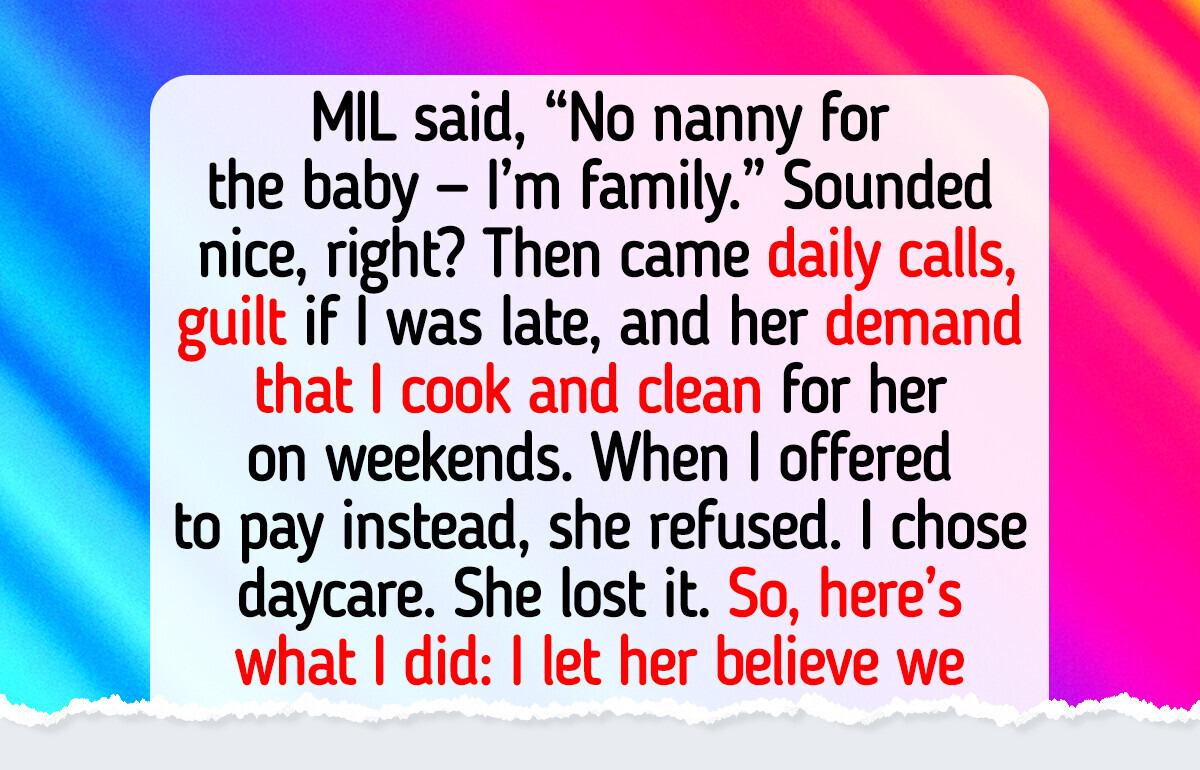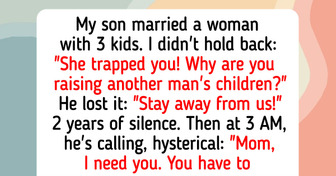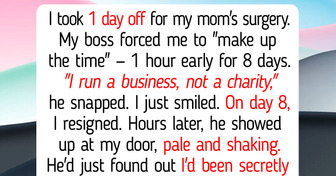Good job mom shove it in mil face you dont need her bullshit interupting your family.. shes only teying to uae the baby as leverage. If she wanted to bond with the baby she wouldnt keep calling you to pick the baby up early.. just bullshit teying to controll your famiy and ultamatums for a free maid. NOT. You go girl..
My MIL Wanted Me to Be Her Free Maid — She Didn’t Expect My Next Move

This time, we received a letter about a mother-in-law story that sparked quite a debate in our inbox. The writer says her MIL crossed a serious line — and not in the usual “unsolicited advice” way. Instead, it turned into a situation that tested patience, boundaries, and a little bit of creativity in getting even.
The letter with her own words:
Hi Bright Side!
She said, “You don’t need daycare — I’m family. Bring him here every morning.”
Sounds generous, right?
Except her version of “helping” meant I’d drop him off, she’d call me five times a day, and guilt-trip me if I didn’t pick him up early.
And when I gently suggested paying her something, she said:
“I don’t need money. But you’ll cook for us on weekends, and maybe clean a little.”
So basically... a trade-off where I’d work two jobs — my actual one and hers.
I politely said no and told her we were enrolling our baby in professional daycare.
She lost it. Said I was “robbing her of bonding time.”
My husband tried to keep the peace, but she made a huge deal out of it.
So here’s what I did:
I let her believe we couldn’t find a daycare spot.
Then, two weeks later, I told her,
“Great news! My boss approved part-time remote. I’ll be home with the baby.”
She was thrilled — until she realized I never asked her to babysit again.
Now she complains that she “hardly sees her grandchild.”
Sorry, but if the price of “bonding” is being someone’s unpaid employee, I’ll pass.
Do you have any advice?
Rachel

Toxic Mothers-in-Law: 12 Signs and How to Handle One Without Losing Your Mind
We all know the saying: “When you marry someone, you marry their family.”
But sometimes, that comes with one person who can turn even the happiest relationship into a battlefield the toxic mother-in-law.
She may smile at family dinners, but behind closed doors? Subtle control, manipulation, or emotional guilt trips can leave you doubting yourself, fighting with your partner, or feeling constantly on edge.
If this sounds familiar, you’re not alone. Here’s how to recognize the red flags and more importantly, how to protect your peace.
What Is a Toxic Mother-in-Law?
A toxic mother-in-law isn’t just “difficult” she’s emotionally draining.
Her words and actions chip away at your confidence, your boundaries, and sometimes even your relationship.
While some of her behavior may be intentional, many toxic patterns come from her own unresolved issues, insecurities, or habits learned in her family. Whatever the reason, you don’t have to tolerate it.
12 Signs You’re Dealing With a Toxic Mother-in-Law
1. She Doesn’t Respect Boundaries
She shows up uninvited, criticizes your parenting, or encourages your partner to keep secrets. Healthy families respect limits toxic ones bulldoze them.
2. She’s Always Right (and You Never Are)
From how you cook to how you raise your kids, she’s got opinions on everything. And if you disagree? You’re instantly “ungrateful.”
3. She’s a Master Manipulator
She knows exactly how to twist the situation guilt trips, silent treatment, fake tears, or “help” that comes with strings attached.
4. She’s Emotionally Abusive
No yelling needed. Her weapon is control isolating you, undermining you, or making you question your own worth.
5. She’s Passive-Aggressive
She says she’s “fine,” but refuses to eat your dinner. She “forgets” to invite you. Every action drips with unspoken disapproval.
6. She’s a One-Upper
Got a promotion? She had two. Bought a new car? Hers is better. Toxic mothers-in-law often compete for attention — and for their child’s loyalty.
7. She Loves to Gossip
She doesn’t just chat — she spreads. Expect her to “confide” about you to relatives, painting herself as the saint and you as the problem.
8. She’s Impossible to Please
You could host a perfect dinner, and she’d still mention how she does it differently. It’s not about food — it’s about control.
9. She “Helps” Without Asking
Reorganizing your kitchen, washing your baby’s clothes differently, “fixing” what wasn’t broken — it’s her way of saying you can’t do it right.
10. She’s a Narcissist
She needs attention, validation, and admiration — all the time. Empathy isn’t her strong suit, and she’ll never truly see your side.
11. She Makes You Doubt Yourself
She plants tiny seeds of self-doubt: “Are you sure that’s the best choice?” Over time, it erodes your confidence.
12. She Ignores You Completely
She talks only to your partner at family events, pretending you don’t exist. It’s her ultimate power play — silence as punishment.
How to Deal With a Toxic Mother-in-Law

You can’t control her — but you can control how you respond.
1. Communicate With Your Partner
Be honest but calm. Explain how her behavior makes you feel without blaming. Your partner may not see it, especially if they’ve grown up normalizing it.
2. Set Realistic Expectations
You can’t change her. You can change how much space she takes up in your mind. Expect less, and you’ll feel freer.
3. Practice Self-Care (Seriously)
Toxic people drain energy. Recharge with journaling, therapy, or simply saying “no.” Protecting your peace is not selfish — it’s survival.
4. Don’t Take the Bait
When she plays the victim — “I was only trying to help!” — don’t bite. Stay calm. Her chaos loses power when you don’t react.
5. Don’t Take It Personally
Remember, it’s not about you. You’re just a convenient target for old wounds she never healed.
6. Set Firm Boundaries (and Stick to Them)
Agree with your partner on what’s okay — and what’s not. That might mean:
No unannounced visits
No gossip about your private life
No financial “gifts” with hidden strings
Boundaries are love — for yourself, your partner, and even her.
Dealing with a toxic mother-in-law can test even the strongest relationships.
But once you spot the patterns, you can stop taking them personally — and start protecting your peace.
You deserve a family dynamic that feels safe, calm, and respectful. And sometimes, that starts with one powerful word: no.
13 Stories That Prove Kindness Is the Quiet Superpower We All Share
Comments
Related Reads
My MIL Demanded Rent for a House That Isn’t Hers, I Turned the Tables

I Refused to Help My Dad With His Hospital Bills, I’m Not Here to Rescue Him

I Tried to Be the Perfect Stepmom — but My Husband Just Made Me Feel Worthless

16 Stories That Prove Kindness Still Wins in Our Broken World

16 Stories That Prove a Parent’s Love Can Fight Through Anything

My Parents Wanted a ‘Family Vacation’ on My Budget—I Made One Move They Didn’t Expect

I Refuse to Help My Coworker Who Treats My Kindness Like an Obligation

I Paid Half the Mortgage for Years—Then I Refused to Be Used Anymore

I Refuse to Return to the Office After My Coworker’s ‘Prank’ Revealed His Darkest Secret

I Quit After My Boss Punished Me for Attending My Mom’s Surgery

14 Real Moments When Empathy Changed Everything Forever

I Refuse to Work Three Unpaid Weekends to Prove Loyalty — HR Got Involved
